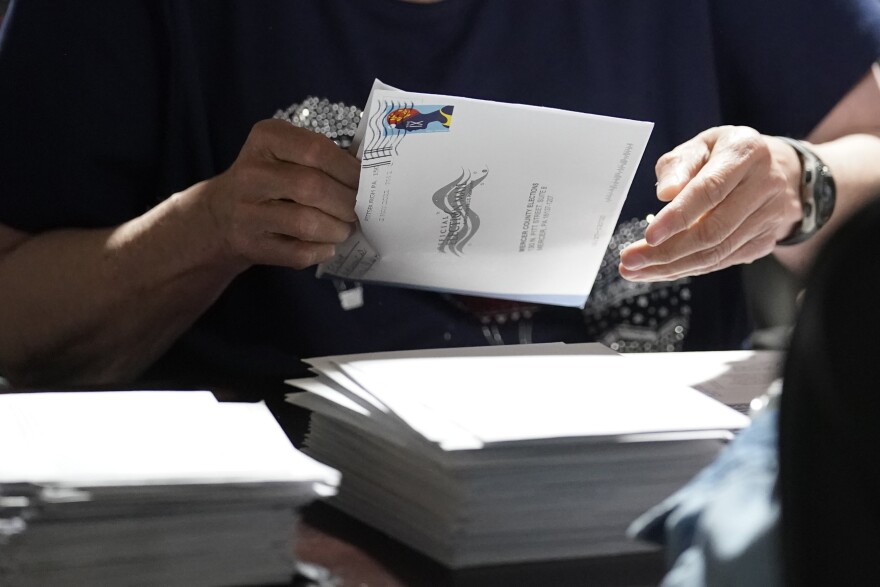A Pennsylvania state court has ruled mail-in voters can be allowed to fix small issues with their ballots before they’re counted – but not all counties may offer the option during the midterms.
Commonwealth Court Judge Ellen Ceisler ruled in a 58-page opinion against the Republican National Committee, which partnered with other GOP groups to sue the Department of State and county election boards. The group’s aim was to prevent election officials from allowing what’s known as ballot curing.
The RNC argued state election law doesn’t allow for curing, but Ceisler determined that while the law doesn’t require counties to offer the option, it doesn’t prohibit it either.
“The courts have held that any doubt about whether the Election Code authorizes County Boards to implement notice and cure procedures must be resolved in favor of preventing the inadvertent forfeiture of electors’ right to vote,” Ceisler wrote.
The Department of State celebrated the ruling in a statement.
“We are pleased that the Court denied [the RNC et. al’s ] request,” Deputy Communications Director Mark Walters wrote. “We support continuing to allow counties to notify voters of [any] deficiencies so that they can take steps to protect their constitutional right to vote,”
The Republican group’s complaint was similar to one the party’s adherents lodged during the 2020 election, that places such as Berks County notified voters that they could fix issues with things such as ballot envelope signatures ahead of Election Day, while others, including, Carbon and Dauphin counties, did not. Those complaints erroneously suggested that only counties controlled by Democrats allowed such fixes.
While it may be appealed to the state Supreme Court, Ceisler’s ruling could clear the way for election boards to offer ballot curing. But since counties run their own elections, the decision on whether voters can fix small mistakes will depend on where they live.
For instance, officials in Perry and Cumberland counties told WITF they were still trying to hash out the legal implications of the court decision. Cumberland County spokesperson Samantha Krepps said any clarity on ballot curing might be temporary.
“The Commonwealth Court’s ruling was only a preliminary injunction to prohibit counties from implementing cure procedures for mail-in and absentee ballots in the upcoming election,” Krepps said in a statement. “Since the Court has to rule on the merits of the RNC’s petition at a future date, and the matter is still not resolved, we cannot comment on pending litigation.”
Philadelphia County leaders are following a similar course. Deputy Commissioner Nick Custodio said the city was still “analyzing” Ceisler’s ruling.
“We work hard to ensure voters are informed and will be continuing that work in this cycle,” he wrote.
Philadelphia offered a type of ballot curing last year, allowing absentee or mail-in voters to verify their identity if election workers couldn’t do so ahead of Election Day. Ceisler pointed out in her decision that state law already permits that process.
Other election boards in Allegheny and Montgomery counties are offering ballot curing for midterm voters.
Montgomery’s Chief Clerk of Elections Lee Soltysiak said the county has provided that option in the past. The idea, he explained, is to help the few hundred voters who typically make minor mistakes on their ballots. Since 2020, several hundred thousand people have voted by mail in Montgomery County elections.
Soltysiak added in-person voters in every county are allowed to fix issues on their ballots at polling places before handing them in.
“We’re simply giving people [who vote by mail] the same opportunity to correct any issues that may have caused their ballot not to be counted,” Soltysiak said.
Berks County is also offering mail-in voters the chance to fix minor issues before Election Day, but Public Relations Officer Stephanie Weaver said election workers are not “proactively” alerting them. Instead, mail-in voters will be notified by the state’s SURE database of issues such as missing secrecy envelopes once they turn in their ballot. They can then contact the county election board and fix any issue at its offices.
The patchwork nature of county election procedures has frustrated workers and activists for years. Rich Garella of Protect Our Vote Philly said his group is among those that have been pushing for a more unified election system.
“It’d be great to have even some guidelines and procedures for fixing these ballots,” Garella said, adding counties that don’t already offer some type of curing are doing their voters a “disservice.”
Mail-in voters should follow every step to the letter. Forgetting things such as using the secrecy envelope could lead to headaches or rejection of ballots.
If you do mess up, call your county election office to see what can be done. You’ll likely have to exchange your mail-in ballot for an in-person one at your polling place on Election Day, Nov. 8.






